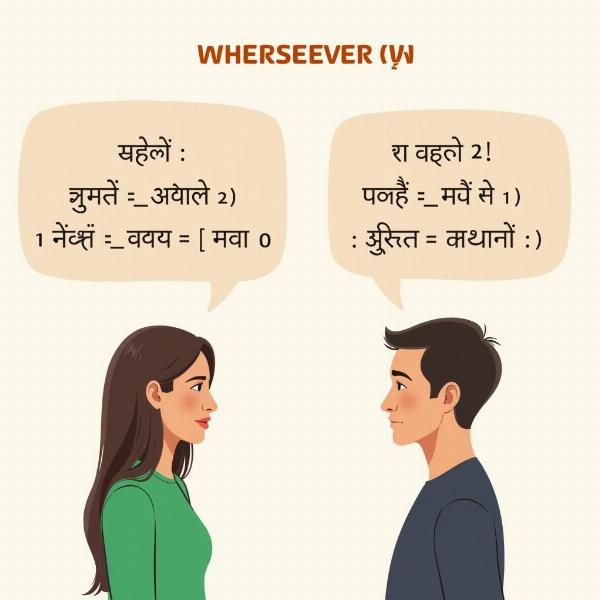Understanding the meaning and usage of “wheresoever” can be tricky, especially when translating it to Hindi. This article provides a deep dive into the meaning of “wheresoever” in Hindi, exploring its various nuances, synonyms, and cultural contexts. We’ll also discuss common usage scenarios and offer practical examples to solidify your understanding.
Decoding “Wheresoever”
“Wheresoever” is an archaic or literary term, essentially meaning “wherever” or “to any place where”. It emphasizes the unlimited or unrestricted nature of the location. While less common in everyday conversation, it still appears in legal, formal, or poetic contexts.
Hindi Equivalents of “Wheresoever”
Translating “wheresoever” directly into Hindi requires capturing its sense of unlimited scope. Several Hindi words and phrases can achieve this:
- जहाँ कहीं भी (jahān kahīn bhī): This is the most common and versatile equivalent, meaning “wherever” or “anywhere.”
- कहीं भी (kahīn bhī): This shorter version, meaning “anywhere,” is suitable for informal contexts.
- जहाँ चाहे वहाँ (jahān chāhe vahān): This phrase, meaning “where one desires, there,” emphasizes the element of choice.
- सर्वत्र (sarvatra): Meaning “everywhere” or “in all places,” this term suggests a more comprehensive scope.
The choice of which term to use depends on the specific context and the desired level of formality.
Practical Usage and Examples
Understanding the nuanced differences between these translations is crucial for accurate and natural-sounding Hindi. Let’s look at some examples:
-
English: “Wheresoever you go, I will follow.”
-
Hindi: “जहाँ कहीं भी तुम जाओगे, मैं तुम्हारे पीछे आऊँगा।” (jahān kahīn bhī tum jāoge, main tumhāre pīche āūngā.)
-
English: “Wheresoever he may be, he will hear the news.”
-
Hindi: “वह जहाँ भी हो, उसे खबर मिल जाएगी।” (vah jahān bhī ho, use khabar mil jāegī.)
 Illustrating Wheresoever in Hindi Conversation
Illustrating Wheresoever in Hindi Conversation
Wheresoever in Legal and Formal Contexts
“Wheresoever” often appears in legal or formal documents. In these cases, जहाँ कहीं भी (jahān kahīn bhī) provides the necessary gravitas and precision. For example, a legal document might state, “Wheresoever the contract is signed, it shall be binding.” The corresponding Hindi translation would be “जहाँ कहीं भी अनुबंध पर हस्ताक्षर किए जाते हैं, वह बाध्यकारी होगा।” (jahān kahīn bhī anubandh par hastākṣar kie jāte hain, vah bādhyakārī hogā.)
Navigating Cultural Nuances
While the direct translations are often sufficient, cultural context can influence the most appropriate choice. For instance, when discussing pilgrimage sites, सर्वत्र (sarvatra) might be a more fitting choice.
What is the difference between wherever and wheresoever?
Wherever is the more common and modern term, used in everyday speech and writing. Wheresoever is archaic and more formal, often found in legal or literary texts. Both convey the idea of “to any place,” but “wheresoever” adds a sense of formality and emphasis.
Can I use “kahin bhi” in formal writing?
While “kahīn bhī” is generally acceptable, “jahān kahīn bhī” is preferred for formal writing due to its more comprehensive and explicit nature.
Conclusion
Understanding the subtleties of “wheresoever” and its Hindi equivalents is essential for clear communication. By considering the context and nuances of each option, you can ensure your translations are both accurate and culturally appropriate. Remember to choose the translation that best reflects the tone and register of your text, be it formal, informal, or literary.
FAQ
- What is the literal translation of “wheresoever” in Hindi? The most literal translation is “jahān kahīn bhī,” which captures the unrestricted sense of location.
- Can I use “sarvatra” interchangeably with “wheresoever”? While both convey a sense of broad scope, “sarvatra” implies “everywhere,” whereas “wheresoever” focuses on the freedom to choose any location.
- Is “wheresoever” still used in modern English? It is less common and considered archaic, mainly appearing in formal or literary contexts.
- What is the most common Hindi equivalent of “wheresoever”? “Jahān kahīn bhī” is the most commonly used and versatile equivalent.
- Why is understanding the nuances of translation important? Nuances ensure accuracy and convey the appropriate tone and cultural context.
- What are some other ways to express “wheresoever” in Hindi? Other options include “kahīn bhī” and “jahān chāhe vahān,” depending on the context.
- Where can I find more examples of “wheresoever” used in sentences? Online dictionaries and corpora offer numerous examples of usage.
Related Articles
Connect with Meaning-Hindi.in
Meaning-Hindi.in offers expert translation services for a wide range of needs, from business and legal documents to technical manuals and website localization. Our team of experienced translators ensures accurate and culturally sensitive translations, bridging the language gap for seamless communication. Whether you need quick turnaround times or specialized industry expertise, we tailor our services to meet your specific requirements. Contact us today for all your Hindi translation needs!
Email: [email protected]
Phone: +91 11-4502-7584
Meaning-Hindi.in is your trusted partner for professional Hindi translation services.